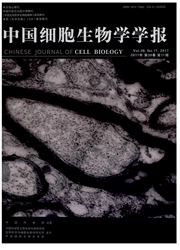

 中文摘要:
中文摘要:
随着全球老龄化时代的到来,衰老和衰老相关疾病带来的健康问题日益突出。如何最大限度地维持老龄人口健康、干预衰老相关疾病并延缓衰老的发生对于医疗系统、科研机构乃至整个社会都是巨大的挑战。目前,对于衰老的分子机制研究已经有长足的进步,对于衰老进程的生物学和遗传学机制已有突破性的认识,对于衰老相关疾病的发病机制也有了深刻的理解。但这些研究成果还远远达不到能够延缓人类衰老并遏制衰老相关疾病的发生的要求。该文将从衰老的分子机制和干预手段这两个方面入手,综述衰老的理论研究和实际应用中的主要成果和最新进展。
 英文摘要:
英文摘要:
The world has heralded the coming of an aging era and the health issues of aging and aging-related diseases have become inevitable challenges to all countries. The key challenges to the health system, research institutions and the society are how to maintain healthy aging, how to intervene the development of aging-related diseases and how to slow down the aging process. In the past few decades, there have been tremendous advances in comprehending the molecular mechanism of aging, the biology and genetics of aging and the pathogenesis of aging-related diseases. However, these research advances have not attained to the ultimate goal in slowing down aging process in humans and curing aging-related diseases. This review will summarize most recent advances in the research of aging with a focus on the molecular mechanism and intervention strategies.
 同期刊论文项目
同期刊论文项目
 同项目期刊论文
同项目期刊论文
 Association of PPP1R3B polymorphisms with blood lipid and C-reactive protein levels in a Chinese pop
Association of PPP1R3B polymorphisms with blood lipid and C-reactive protein levels in a Chinese pop Substituting White Rice with Brown Rice for 16 Weeks Does Not Substantially Affect Metabolic Risk Fa
Substituting White Rice with Brown Rice for 16 Weeks Does Not Substantially Affect Metabolic Risk Fa RACK1 modulates NF-kappaB activation by interfering with the interaction between TRAF2 and the IKK c
RACK1 modulates NF-kappaB activation by interfering with the interaction between TRAF2 and the IKK c Effects of flaxseed supplementation on erythrocyte fatty acids and multiple cardiometabolic biomarke
Effects of flaxseed supplementation on erythrocyte fatty acids and multiple cardiometabolic biomarke Interaction between a common variant in FADS1 and erythrocyte polyunsaturated fatty acids on lipid p
Interaction between a common variant in FADS1 and erythrocyte polyunsaturated fatty acids on lipid p Effects of Body Fat on the Associations of High-Molecular-Weight Adiponectin, Leptin and Soluble Lep
Effects of Body Fat on the Associations of High-Molecular-Weight Adiponectin, Leptin and Soluble Lep PAQR3 modulates insulin signaling by shunting phosphoinositide 3-kinase p110a to the Golgi apparatus
PAQR3 modulates insulin signaling by shunting phosphoinositide 3-kinase p110a to the Golgi apparatus c-Jun Amino-Terminal Kinase-1 Mediates Glucose-Responsive Upregulation of the RNA Editing Enzyme ADA
c-Jun Amino-Terminal Kinase-1 Mediates Glucose-Responsive Upregulation of the RNA Editing Enzyme ADA All-trans retinoic acid potentiates the chemotherapeutic effect of cisplatin by inducing differentia
All-trans retinoic acid potentiates the chemotherapeutic effect of cisplatin by inducing differentia Effects of a low-carbohydrate diet on weight loss and cardiometabolic profile in Chinese women: a ra
Effects of a low-carbohydrate diet on weight loss and cardiometabolic profile in Chinese women: a ra Association of TMPRSS6 polymorphisms with ferritin, hemoglobin, and type 2 diabetes risk in a Chines
Association of TMPRSS6 polymorphisms with ferritin, hemoglobin, and type 2 diabetes risk in a Chines Association between Common Variants in PPARD and Type 2 Diabetes and Modifying Effect of Vitamin D a
Association between Common Variants in PPARD and Type 2 Diabetes and Modifying Effect of Vitamin D a Associations of erythrocyte palmitoleic acid with adipokines, inflammatory markers, and metabolic sy
Associations of erythrocyte palmitoleic acid with adipokines, inflammatory markers, and metabolic sy High fat diet induces formation of spontaneous liposarcoma in mouse adipose tissue with overexpressi
High fat diet induces formation of spontaneous liposarcoma in mouse adipose tissue with overexpressi Critical Roles of p53 in Epithelial-Mesenchymal Transition and Metastasis of Hepatocellular Carcinom
Critical Roles of p53 in Epithelial-Mesenchymal Transition and Metastasis of Hepatocellular Carcinom PKA phosphorylation couples hepatic inositol-requiring enzyme 1 alpha to glucagon signaling in gluco
PKA phosphorylation couples hepatic inositol-requiring enzyme 1 alpha to glucagon signaling in gluco Wld(S) Enhances Insulin Transcription and Secretion via a SIRT1-Dependent Pathway and Improves Gluco
Wld(S) Enhances Insulin Transcription and Secretion via a SIRT1-Dependent Pathway and Improves Gluco Associations of CFH Polymorphisms and CFHR1-CFHR3 Deletion with Blood Pressure and Hypertension in C
Associations of CFH Polymorphisms and CFHR1-CFHR3 Deletion with Blood Pressure and Hypertension in C The RAS Guanyl Nucleotide-releasing Protein RasGRP1 Is Involved in Lymphatic Development in Zebrafis
The RAS Guanyl Nucleotide-releasing Protein RasGRP1 Is Involved in Lymphatic Development in Zebrafis Fasting-induced protein phosphatase 1 regulatory subunit contributes to postprandial blood glucose h
Fasting-induced protein phosphatase 1 regulatory subunit contributes to postprandial blood glucose h Hepatic deletion of Smad7 in mouse leads to spontaneous liver dysfunction and aggravates alcoholic l
Hepatic deletion of Smad7 in mouse leads to spontaneous liver dysfunction and aggravates alcoholic l EphB3 Is Overexpressed in Non-Small-Cell Lung Cancer and Promotes Tumor Metastasis by Enhancing Cell
EphB3 Is Overexpressed in Non-Small-Cell Lung Cancer and Promotes Tumor Metastasis by Enhancing Cell Sorafenib Suppresses Postsurgical Recurrence and Metastasis of Hepatocellular Carcinoma in an Orthot
Sorafenib Suppresses Postsurgical Recurrence and Metastasis of Hepatocellular Carcinoma in an Orthot Associations of Amylin with Inflammatory Markers and Metabolic Syndrome in Apparently Healthy Chines
Associations of Amylin with Inflammatory Markers and Metabolic Syndrome in Apparently Healthy Chines Wld(S) Reduces Paraquat-Induced Cytotoxicity via SIRT1 in Non-Neuronal Cells by Attenuating the Depl
Wld(S) Reduces Paraquat-Induced Cytotoxicity via SIRT1 in Non-Neuronal Cells by Attenuating the Depl Associations of erythrocyte fatty acids in the de novo lipogenesis pathway with risk of metabolic sy
Associations of erythrocyte fatty acids in the de novo lipogenesis pathway with risk of metabolic sy In Vivo Disruption of TGF-b Signaling by Smad7 in Airway Epithelium Alleviates Allergic Asthma but A
In Vivo Disruption of TGF-b Signaling by Smad7 in Airway Epithelium Alleviates Allergic Asthma but A RKTG inhibits angiogenesis by suppressing MAPK-mediated autocrineVEGF signaling and is downregulated
RKTG inhibits angiogenesis by suppressing MAPK-mediated autocrineVEGF signaling and is downregulated 期刊信息
期刊信息
